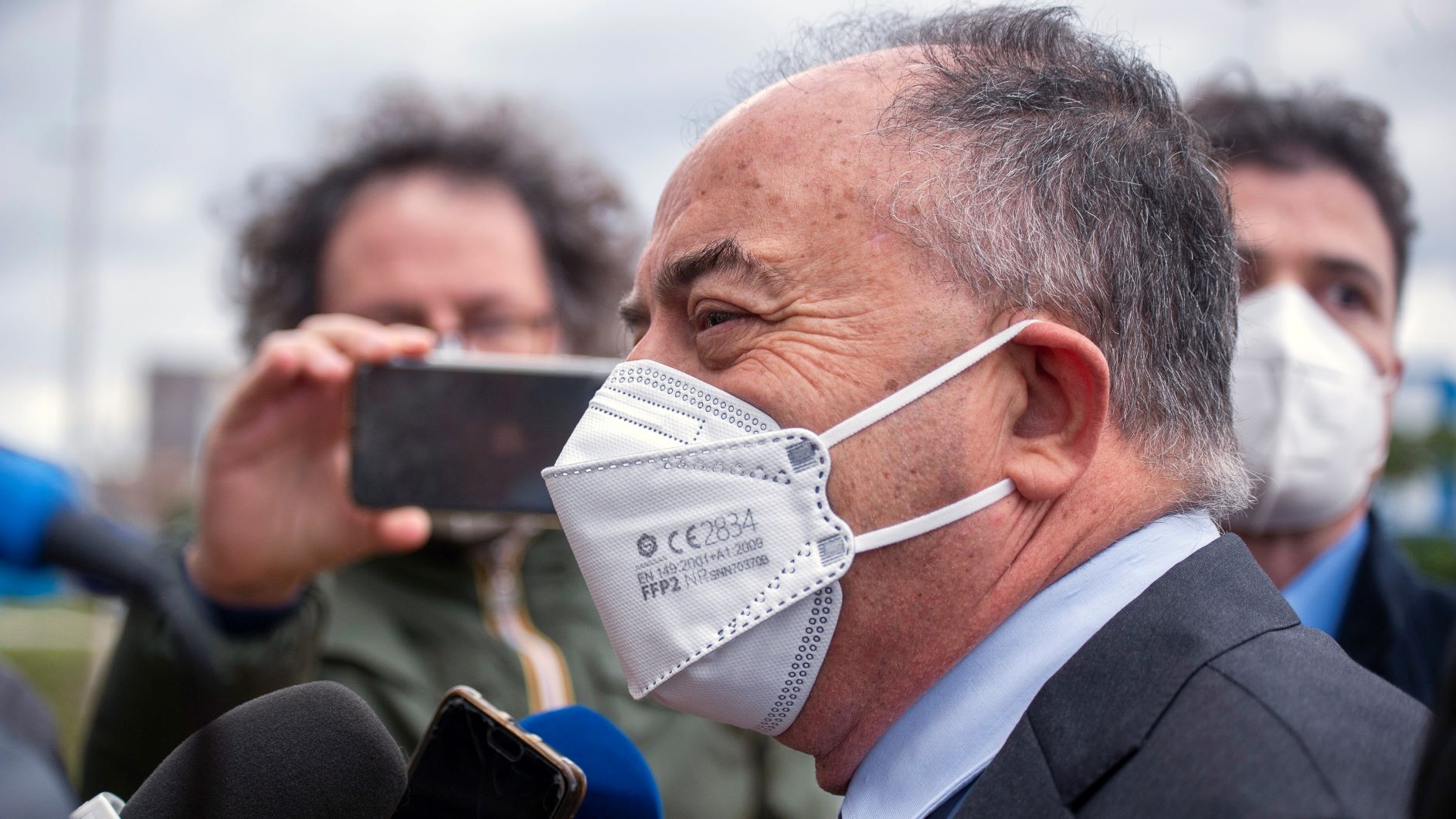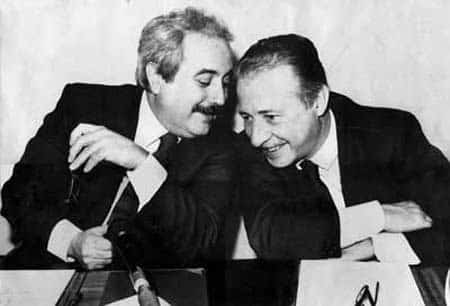Gutsy prosecutors crippled the Cosa Nostra decades ago. Now, a new trial aims to strike a blow against the ‘Ndrangheta, Italy’s dominant mafia.

Anti-Mafia prosecutor Nicola Gratteri arrives for the trial against more than 300 defendants of the ‘Ndrangheta crime syndicate, near the Calabrian town of Lamezia Terme, southern Italy, 13 January 2021. (Valeria Ferraro/LaPresse via AP)
More than three decades ago, a huge trial in Palermo, Italy, began the decline of Sicily’s notorious Cosa Nostra. Now, a new court case aims to deal a heavy blow to the Calabrian ‘Ndrangheta, the Cosa Nostra’s successor as Italy’s dominant mob.
Most films and books about the Italian mafia, like “The Godfather,” reference Sicily’s dreaded criminal society, which transplanted itself into the United States with waves of immigrants and long dominated crime in New York and elsewhere.
But weakened by the Palermo trial and its far-reaching repercussions — especially after the murder of its judicial architects, national heroes Giovanni Falcone and Paolo Borsellino — Cosa Nostra went into decline. While it continues its criminal activities, the unchallenged dominance it once enjoyed was ceded decades ago to the ‘Ndrangheta from Calabria, a region in the toe of Italy’s boot. It has prospered in the shadows.
The ‘Ndrangheta, recognised as one of the world’s richest and most dangerous mob gangs, learned from the fate of Cosa Nostra to avoid a direct challenge to the Italian state and spectacular killings of officials.
It kept its profile low but built a formidable empire based on the cocaine trade and financed by the proceeds from a lucrative era of kidnappings, including the 1973 abduction of the grandson of John Paul Getty, at that time the world’s richest man.
The ‘Ndrangheta are notorious for their brutality.
The ‘Ndrangheta, notorious for their brutality, hid Getty in the wild Calabrian mountains for five months. When his miserly grandfather refused to negotiate, his captors severed the boy’s ear and sent it through the post to a Rome newspaper, eventually pocketing a ransom of $3 million.
The ‘Ndrangheta is believed to control up to 80% of the European cocaine trade, and its tentacles extend not only all over Italy, including the industrialised north, but to more than 30 countries, including Australia, Bulgaria, Canada, Germany, Switzerland and the United States.
Police and experts say the ‘Ndrangheta has built a global network to bring cocaine from South America to Europe, most of it in container ships, via Brazil, West Africa, South Africa and the Sahel. Its biggest presence outside Italy is in Germany, but the most infiltrated foreign city is Toronto, with seven mafia families.
Its annual turnover has been estimated as more than 50 billion euros ($61 billion), more than McDonald’s and Deutsche Bank combined.
The new trial, the biggest since Palermo’s ”Maxiprocesso,” began last month. Some 350 people are on trial, many of them white collar workers including lawyers, businessmen, a police chief and politicians, including a former senator. More than 900 witnesses have been called.
Palermo trial exposed the Mafia’s organisation.
While the ‘Ndrangheta quietly built their cocaine empire, establishing close links with South American cartels and affiliations with organised crime groups all over the world, Cosa Nostra — ruled by boss of bosses Salvatore “Totò” Riina, nicknamed the “Beast” — became more and more violent in the 1980s and 1990s.
The brilliant Sicilian magistrate Giovanni Falcone and his friend Borsellino proved that Cosa Nostra was a hierarchical single organisation and not a collection of separate clans, which had previously been disputed. This was upheld in the Palermo trial in 1986-87, with historic ramifications for law enforcement. More than 330 gangsters were convicted, including the fugitive Riina.
In revenge, Riina mounted a bloody campaign against state officials and politicians. When Italy’s Supreme Court confirmed the sentences, the Mafia killed Falcone, his wife and three bodyguards in a massive bomb explosion in 1992. Borsellino and five bodyguards died in another blast two months later.

Giovanni Falcone and Paolo Borsellino in 1992
(With permission of Tony Gentile)
The bombings and subsequent attacks on tourist targets in mainland Italy that killed 10 people caused public revulsion and accelerated the decline of Cosa Nostra, widening the opening for the ‘Ndrangheta.
Riina, who had been in hiding for 23 years, probably with the complicity of local officials, was captured in 1993 and jailed. He died in prison in 2017.
New anti-mafia hero in Italy
The new trial, in the Calabrian town of Lamezia Terme, is the work of Italy’s highest profile anti-mafia prosecutor, Nicola Gratteri, himself a Calabrian, who has spent 30 years under close police protection, unable to lead a normal life.
Police wiretaps were recently reported to have picked up suspected mafiosi referring to Gratteri as “a dead man walking.”
Like the Palermo trial, this case is being held in a specially fortified courtroom, which has been equipped with spacing between defendants and audio-visual connections because of COVID-19. The ‘Ndrangheta has profited from the pandemic, allegedly skimming health funds and lending money to stricken businesses.
This trial differs from Palermo because it concerns only one group, the powerful Mancuso ndrina, or clan, rather than many as indicted by Falcone.
Prosecutor hopes trial will loosen tongues.
Previous, less publicised trials established that the ‘Ndrangheta also had a hierarchical structure and confirmed links with Milan that had been denied by city officials. It exposed the quasi-religious rituals and terminology of the ‘Ndrangheta, which like Cosa Nostra dates back to Italian unification in the mid-19th century. Its name comes from a Greek word loosely translated as “men of honour.”
Unlike Cosa Nostra or even more so the U.S. mafia, the rural-based ‘Ndrangheta has remained until now largely below the public radar, with its bosses living in remote villages and building complex tunnels and underground hideouts.
Based on blood ties, it has been less prone to informants than Cosa Nostra, whose code of omertà, or silence, was undermined by a bloody war between Riina’s Corleonesi and other clans. This made the Calabrian mob more attractive to South American drug cartels.
Gratteri and his team have begun to break this silence, with around 50 informants testifying at the trial, including a nephew of clan boss Luigi Mancuso, 66. This is one of the key aspects of the case.
The nexus between Calabrian gangsters and politics was underlined last month when the leader of a small national party, who was briefly involved in negotiations to end a government crisis, was put under investigation by Gratteri.
Italy’s weapons against mafia
Italy has powerful weapons against mafias unavailable in many countries, including laws that enable it to try an entire organisation in mass trials rather than individual criminals, and to confiscate the assets of gangsters and their relatives. It also has sweeping wire tap powers.
Criminologists say that the ‘Ndrangheta “pollutes” the countries where it spreads by corrupting everyone from politicians to police and judges, laundering its vast funds into legal enterprises.
Fighting the mafia internationally means a broad societal response, not just arresting violent criminals, and combating the poverty and under-development that enables the mafia to thrive in southern Italy and elsewhere.
“To fight this form of complex organised crime, one needs to follow the money and identify where the proceeds of crime go,” said Anna Sergi, a criminologist at the University of Essex in England. “Targeting the power-mafia nexus is key.”
Professor Antonio Nicaso, an organised crime expert at Queen’s University in Canada, said the ‘Ndrangheta wants to avoid publicity and only uses violence when there is no alternative. “It does not want to create social alarm. You must not focus only on the ‘military’ aspect,” he told News Decoder.
“It is a power system and network, like a multilateral corporation, with the ability to merge tradition and innovation. Its ultimate goal is power. The drug economy is not parallel to the legal economy but is integrated with it. There is corruption without the mafia but no mafia without corruption.”
Gratteri accuses the ‘Ndrangheta of “suffocating” his home region, one of Italy’s poorest, but he acknowledges that this trial will not destroy the syndicate, which has proved itself extremely adaptable.
However, he believes the trial — codenamed “Rebirth” — will encourage more people to break their silence, opening the way for other trials and bringing the “liberation” of Calabria.
Three questions to consider:
- Why and when did Sicily’s Cosa Nostra decline?
- How rich is the ‘Ndrangheta?
- What are the lessons of the trial for other countries?

Barry Moody was Africa Editor for Reuters for 10 years and Middle East editor for seven, during which time he led coverage of the 2003 Iraq war. He worked on every continent as one of the agency’s most experienced foreign correspondents and editors. His postings included Tanzania, Kenya, South Africa, Italy, Hong Kong, Australasia and the United States. He ran editorial operations in Italy, Spain, Greece and Portugal at the height of the EU debt crisis.
